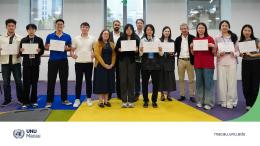The United Nations family and other multilateral institutions continually seek innovative approaches to make their processes more inclusive. However, a persistent "perspective deficit" affects collective decisions globally, with certain voices – particularly vulnerable or conflict affected communities, or the very young/elderly – remaining systematically underrepresented in policy forums.
A promising solution has emerged: AI-powered systems that create virtual representations of underrepresented groups, allowing them to "participate" in multilateral processes. Generative AI can produce virtual representations through which traditionally unheard stakeholders gain "voice" – what Scheuermann and Aristidou call "AI Voice" – in critical discussions ranging from climate action to sustainable development.
AI proxies can support rapid assessments, negotiations and virtual dialogues
This approach stands apart from traditional AI-based sentiment analytics. While conventional methods merely mine and measure existing opinions, AI agents can actively engage in dialogue about hypothetical scenarios, offering insights into how marginalized communities might respond to proposed policies before implementation.
Read the rest of the article here.



